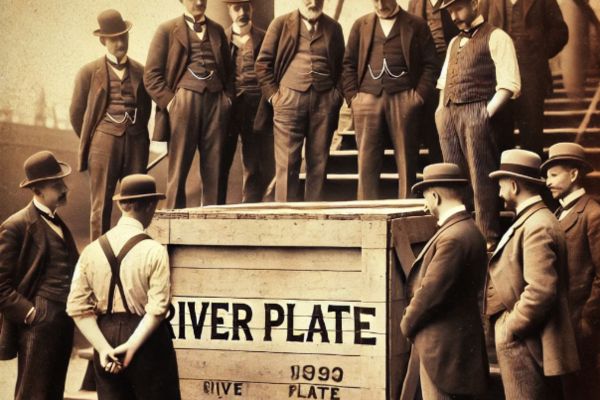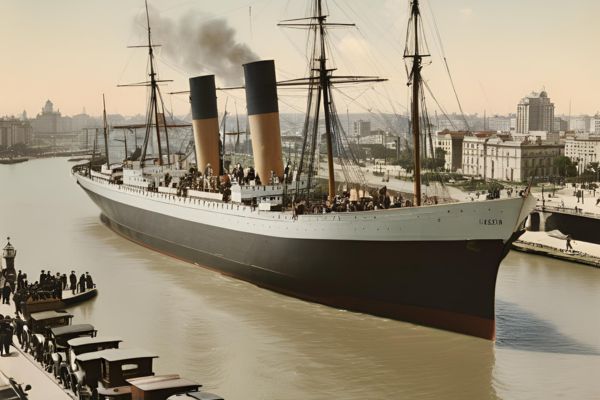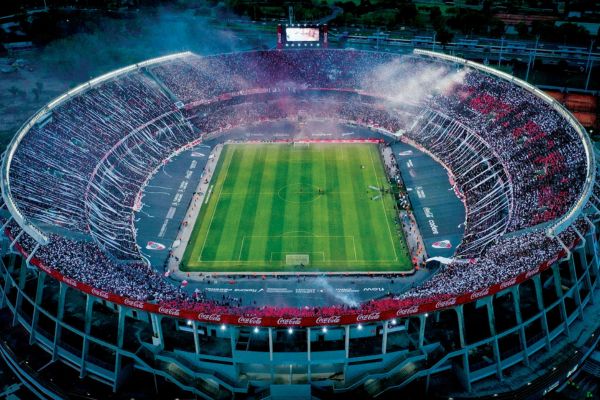The sound of Toot! Toot! echoes through the busy port as a large steamship eases into dock. It’s early May, 1901, and the stone docks of Buenos Aires are bustling. Cranes creak overhead. Men shout orders over the clatter of carts and crates. Argentina is in the middle of a golden era of trade, and the ports are the lifeblood of the capital.
In the middle of this organized chaos, a man stands to one side—neatly dressed in trousers, waistcoat, and a white shirt with sleeves rolled up against the warm day. He’s removed his jacket, which is folded neatly over one arm. His attention, however, isn’t on the ships or the noise around him. He’s deep in thought.
Reaching into his pocket, he pulls out a small box of matches. He strikes one against the coarse stone of the dock. A tiny flame flares to life, and with a soft draw on his pipe—stuffed with tobacco just moments before—he lights it. Smoke curls around his face as he exhales and lets his eyes wander.
That’s when he sees it.
A wooden crate is being slowly lowered from the ship by thick ropes. As it descends past his line of sight, it catches the light just enough for him to spot the bold, black lettering stamped on its side: “River Plate.”
The man takes a slow puff and steps forward. He knows what it is—a crate bound from England, marked with the anglicised name for the Río de la Plata, the great river that borders Buenos Aires. But it’s more than just a label. In that moment, something clicks.
You see, this man is one of the founding members of a new football club—formed just days earlier by a group of young players from the La Boca neighborhood. They’ve been searching for a name, something that would stand out among the many teams forming in the city.
As he gazes at the crate, the answer seems obvious.
From a Crate to a Club

As legend has it, that moment on the docks was just the beginning.
From those humble origins, River Plate would go on to become a giant in Argentine football—a name that echoed far beyond the crates and cranes of Buenos Aires’ ports. What started as a team of local dreamers quickly grew into a powerhouse, known for its elegance on the field and fierce determination to win.
Over the decades, River built a legacy filled with legendary players, unforgettable matches, and dozens of championships. But no symbol reflects the club’s ambition more than its iconic stadium: El Monumental.
Opened in 1938, El Monumental isn’t just the home of River Plate—it’s a cathedral of Argentine football. Massive, imposing, and rich with history, the stadium has hosted World Cup finals, historic derbies, and moments that shaped a nation’s sporting identity.
And yet, like the club itself, even El Monumental carries traces of its past. During recent renovations, workers uncovered old horseshoes buried beneath the pitch—ghosts of a time before the stadium existed, when the land was still open grounds. Read: The Secret That Lies Beneath El Monumental
A Legacy Shaped by Rivalry

To fully understand River’s story, though, you have to look across town—toward La Boca, where their fiercest rivals, Boca Juniors, were born. Both clubs emerged from the same working-class portside culture, but took different paths.
River would move north to wealthier neighborhoods. Boca stayed put in La Boca, embracing their gritty roots. The result was one of the fiercest rivalries in world football. And in a twist of fate, one match would even change Boca’s identity forever. Read: How a Single Match Cost Boca Juniors Its Identity
Years later, that rivalry reached its most explosive moment—not in Buenos Aires, but over 10,000 kilometers away in Spain. Find out how River and Boca ended up battling it out in one of football’s most dramatic finals in The Only Stadium to Host Two Unique Finals.
More Than Just a Name

It’s almost amusing to think that a football club of such stature could trace its name back to something as mundane as a shipping crate. But that’s what makes River Plate’s story special. It’s a reminder that inspiration can strike at any moment—and that something ordinary can spark a legacy that endures for generations.
From the stone docks of Buenos Aires to the stands of El Monumental, the name River Plate has come to mean more than anyone could have imagined in 1901. It’s a name that represents vision, resilience, and a relentless pursuit of greatness.
And to think—it all started with a box.
